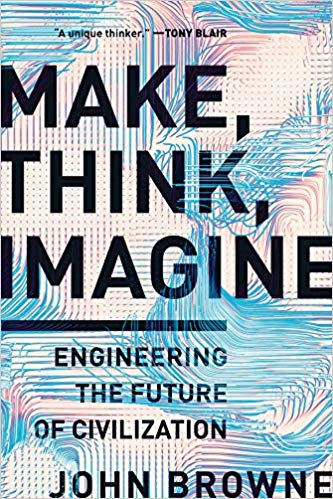You have /5 articles left.
Sign up for a free account or log in.
 Make, Think, Imagine: Engineering the Future of Civilization by John Browne
Make, Think, Imagine: Engineering the Future of Civilization by John Browne
Published in August 2019.
Make, Think, Imagine has all the ingredients of types of books that I usually love.
The history and future of technology -- check.
An optimistic viewpoint about the role of technology in driving widespread economic well-being -- check.
An argument that the process of invention an innovation lies at heart of progress -- check.
Moreover, my appreciation for how engineers approach education leaves me particularly inclined to be sympathetic to an engineering-based worldview.
At my institution, at least, engineering education is the model of how I think teaching and learning should be constructed. That is a project-based, experiential and hands-on way of learning -- with professors working alongside students designing and building applications, devices and machines.
It is with regret, therefore, that I report that Make, Think, Imagine never entirely comes together.
The challenge is that Browne, the former CEO of BP, sets his lens for viewing the impact of engineering on social and economic progress much too widely. The result is that those readers who know something about various areas of technology -- from self-driving cars to artificial intelligence -- will find the book’s treatment of these subjects to be superficial.
Knowing that Browne’s tenure as CEO of BP was controversial for his efforts (mostly failed) to diversify the company into renewable energy, I had expected the book to dive deeply into the future of energy. Browne, however, chooses only to skim the surface of the likely path that the transition from carbon-based to renewable energy sources will take.
This is not to say that I’m against you reading this book. Make, Think, Imagine gets better as it goes along. Browne offers some glimpses into his fascinating life as a second-generation oil executive.
It is also fun to read about Browne’s post-BP life, renovating his London home with every imaginable gadget and filling his Venice home with art and engineering antiquities. One gets the sense that Browne would be a fascinating dinner guest.
The argument that engineers should aspire to lives of public intellectuals may also resonate with some readers.
We seem to be in a cultural moment where technologists are more reviled than celebrated. Make, Think, Imagine can be read as a counterargument to those who decry the influence of technological solutionism.
Nowadays, a book that puts technology -- and technologists -- at the center of the story of human progress is something of an outlier.
What are you reading?




